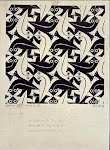The buses in this place are a joke. Always late, wait around for ages, blah blah blah rhubarb boring blah. Nobody enjoys public transport rants. But let me share with you just one tale of woe, occurring one crisp morning of 31st January 2007:
We get on our bus, it refuses to drive. This is normal. In this place you can wait for up to half an hour for a bus to decide to drive away from the stop at which it is nestled. The engine was running for a long time. Then it stopped. Then it started up again. Then it stopped. Then it started up again again. Then it stopped. These were not because the bus was stalling, mind you, it started up completely normally each time, only to decide it was not going to go anywhere. People start getting off the bus.
"I'm really sorry," says the bus driver, "but the bus is broken, so you will all have to get off." At least she has a nice smile and a friendly voice. As soon as the last person has stepped back down onto the pavement, the bus starts up again and drives away. Laughing maniacally, I imagine.
Wednesday 31 January 2007
Sunday 28 January 2007
Error Analysis Saves Lives
So, here it is. Another night-before-lab-book-gets-handed-in, and I am scrawling away, overlooking the criminal nature of my layout, accuracy, maths, logical flaws and so forth (but never my English), in a half-hearted attempt not to fail as badly as last time. It's a small mercy that this particular experiment hasn't had too much in the way of errors, however what it has had has been as excruciatingly painful as usual.
When I run into a tight corner with my write-up, as I nearly always do, I plead to my University Godparents for guidance - Wikipedia and Google. They have been of little help to me tonight, however through them I have apparently learned the importance of error analysis. Columbia University, New York assures me that "bad things can happen if error analysis is ignored". To back up their claim, which in this context is shamefully less than scientific, they have provided the following picture of the derailment at Gare Montparnasse, Paris, 1895:

There you have it. I must press on to avoid causing any such disasters. I'm a little disappointed I was not warned about this in my lab script.
Links of the day: Columbia University's Error Analysis Tutorial
When I run into a tight corner with my write-up, as I nearly always do, I plead to my University Godparents for guidance - Wikipedia and Google. They have been of little help to me tonight, however through them I have apparently learned the importance of error analysis. Columbia University, New York assures me that "bad things can happen if error analysis is ignored". To back up their claim, which in this context is shamefully less than scientific, they have provided the following picture of the derailment at Gare Montparnasse, Paris, 1895:

There you have it. I must press on to avoid causing any such disasters. I'm a little disappointed I was not warned about this in my lab script.
Links of the day: Columbia University's Error Analysis Tutorial
Thursday 18 January 2007
The Wizard and the Spooks
A while ago my tutor (the legendary Wizard), in spite of being a stone-sure atheist put forward the most eloquent argument for why there may exist something beyond everyday experience. This was not his intention, of course; he included it as a speech meant to illustrate the importance of scientific thinking.
Consider the following:
You are trapped inside a bell jar. The bell jar in turn is enclosed by another, larger bell jar, and there is a vacuum in the layer between the two jars. Sound, of course, cannot propagate in a vacuum. There is lots of stuff happening outside the bell jars. You can see plenty of things, because the light can reach you through the jars, but you cannot hear anything. Is that to say that no sound is being made? Perhaps we just do not have the correct tools at our disposal in order to detect the supernatural.
Consider the following:
You are trapped inside a bell jar. The bell jar in turn is enclosed by another, larger bell jar, and there is a vacuum in the layer between the two jars. Sound, of course, cannot propagate in a vacuum. There is lots of stuff happening outside the bell jars. You can see plenty of things, because the light can reach you through the jars, but you cannot hear anything. Is that to say that no sound is being made? Perhaps we just do not have the correct tools at our disposal in order to detect the supernatural.
Wednesday 17 January 2007
Subscribe to:
Posts (Atom)
